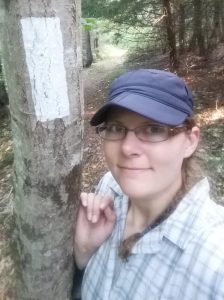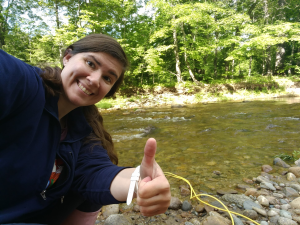
Cheri Dunning began serving as Executive Director in August, 2023, after nearly four years as the volunteer Commissioner from the town of Baldwin.
Cheri’s background is in environmental science, beginning with a Bachelor of Science from Unity College in Maine, and a Master’s Degree from the University of Illinois at Urbana-Champaign, completing her studies in 2007. Her work since then has included forest restoration in the New York City parks system, land stewardship coordination, invasive species control, environmental education, land protection projects, and leading the Three Rivers Land Trust as their first Executive Director. She has professional connections across southern and mid-coast Maine and a passion for protecting the character and environmental health of our region. In her free time, Cheri loves spending time in her garden in West Baldwin (producing way too many cucumbers) and taking opportunities to enjoy the fresh air and vibrant landscapes of Maine.
Please contact Cheri if you have questions about any of the Commission’s programs.
The environmental compliance officer handles all necessary enforcement actions on the commission’s behalf and ensures the compliance of all existing commission orders.
 Jillian Emerson earned her B.S. in Microbiology/Molecular Biology with a minor in Chemistry from Quinnipiac University in 2008. After her degree completion she spent 10 years working in academic research in the Department of Molecular and Systems Biology (formerly Genetics) at the Geisel School of Medicine at Dartmouth College. Most of her work was focused in the area of circadian rhythms using a model fungal organism, Neurospora crassa. In 2018, she earned her ASCP certification in molecular biology (MB, ASCP(CM)). She is currently also the Water Quality Coordinator for Green Mountain Conservation Group in Effingham, NH.
Jillian Emerson earned her B.S. in Microbiology/Molecular Biology with a minor in Chemistry from Quinnipiac University in 2008. After her degree completion she spent 10 years working in academic research in the Department of Molecular and Systems Biology (formerly Genetics) at the Geisel School of Medicine at Dartmouth College. Most of her work was focused in the area of circadian rhythms using a model fungal organism, Neurospora crassa. In 2018, she earned her ASCP certification in molecular biology (MB, ASCP(CM)). She is currently also the Water Quality Coordinator for Green Mountain Conservation Group in Effingham, NH.
The water quality monitoring program manager, hired by the executive director, oversees all facets of the water quality program. Jill develops annual water quality reports for all 20 corridor towns, including recommendations to preserve water quality based on the data collected through the program. She also works with the Maine DEP to ensure the program meets all QAPP (Quality Assurance Project Plan) requirements.
Dan Shorette earned his B.A. in Anthropology and M.A. in Anthropology and Environmental Policy from the University of Maine, earning both in 2016 and 2023, respectively. Dan’s educational background focused on Maine’s historic, archaeological, and environmental past, as well as Maine’s current environmental policies, working closely with members of Maine’s Indigenous tribes and other at-risk communities surrounding water and land rights. Dan has a passion and enthusiasm for environmental protection to leave the world a better place for future generations. He loves spending time with his wife, daughter, and cats.
Please contact Dan with questions about the permit application process.

Emma Pierotti is the water quality coordinator for the Saco River Corridor Commission. In this position she takes water samples from test sites along the Saco River, transports equipment to testing sites, and records and uploads data at the SRCC office.
Emma has lived in the area since 2010, and she currently stays on her family’s farm in East Baldwin. Soon after moving to Maine, she was motivated to start a career in protecting and conserving the state’s natural resources, and joined the SRCC in 2023. While quite new to the field, Emma cares greatly for the work the SRCC does and hopes to continue working with them in the future. As she works with the SRCC, Emma is also studying to earn her environmental science degree at the University of Southern Maine.
Please contact Emma with questions about the water quality monitoring program.
The Saco River Corridor Commission is committed to protecting public health and safety and the quality of life for the state of Maine. The commission regulates land and water uses, protects and conserves the region’s unique and exceptional natural resources, and prevents the detrimental impacts of incompatible development. The commission was established in 1973.